|
|
|
Sort Order |
|
|
|
Items / Page
|
|
|
|
|
|
|
| Srl | Item |
| 1 |
ID:
172176
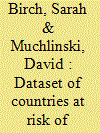

|
|
|
|
|
| Summary/Abstract |
Electoral violence is increasingly affecting elections around the world, yet researchers have been limited by a paucity of granular data on this phenomenon. This paper introduces and describes a new dataset of electoral violence—the Dataset of Countries at Risk of Electoral Violence (CREV)—that provides measures of 10 different types of electoral violence across 642 elections held around the globe between 1995 and 2013. The paper provides a detailed account of how and why the dataset was constructed, together with a replication of previous research on electoral violence. We introduce this dataset by demonstrating that the CREV, while measuring the same underlying phenomena as other datasets on electoral violence, provides researchers with the ability to draw more nuanced conclusions about the causes and consequences of violence that occurs in connection with the electoral process. We also present and analyze descriptive data from the CREV dataset.
|
|
|
|
|
|
|
|
|
|
|
|
|
|
|
|
| 2 |
ID:
170809
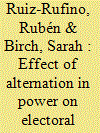

|
|
|
|
|
| Summary/Abstract |
There is as yet little consensus in the literature as to the underlying drivers of electoral violence. This article identifies a key mechanism explaining the use of electoral intimidation, a form of violence, in democratizing regimes. Within this context, we argue that the use of electoral intimidation against the opposition is most likely to be observed when a country moving to democracy has not yet experienced an electoral turnover. Building on previous theoretical and empirical findings, we provide evidence supporting the idea that alternation in power serves as an effective tool to decrease the tensions between electoral winners and losers. Furthermore, we show that alternation in power is conditional on the performance of electoral management bodies. Based on a sample of 331 elections in 53 countries that have inaugurated multiparty competition since 1989, we find strong and robust support for our theoretical claims. Firstly, we show how alternation in power is determined by the degree of autonomy the electoral management body adopted as part of the political opening process. Secondly, we provide evidence that electoral turnover depresses the use of electoral violence after controlling for relevant variables and correcting for selection issues.
|
|
|
|
|
|
|
|
|
|
|
|
|
|
|
|
| 3 |
ID:
170801


|
|
|
|
|
| Summary/Abstract |
Elections are held in nearly all countries in the contemporary world. Yet despite their aim of allowing for peaceful transfers of power, elections held outside of consolidated democracies are often accompanied by substantial violence. This special issue introduction article establishes electoral violence as a subtype of political violence with distinct analytical and empirical dynamics. We highlight how electoral violence is distinct from other types of organized violence, but also how it is qualitatively different from nonviolent electoral manipulation. The article then surveys what we have learned about the causes and consequences of electoral violence, identifies important research gaps in the literature, and proceeds to discuss the articles included in the special issue. The contributions advance research in four domains: the micro-level targeting and consequences of electoral violence, the institutional foundations of electoral violence, the conditions leading to high-stakes elections, and electoral violence in the context of other forms of organized violence. The individual articles are methodologically and geographically diverse, encompassing ethnography, survey vignette and list experiments and survey data, quantitative analyses of subnational and crossnational event data, and spanning Africa, Latin America, and Asia.
|
|
|
|
|
|
|
|
|
|
|
|
|
|
|
|
| 4 |
ID:
181014


|
|
|
|
|
| Summary/Abstract |
Concerns about electoral integrity have increasingly become the focus of political science analysis in recent years, but there has been very little systematic research on the strategic use of allegations of electoral wrong-doing for political advantage. Drawing on the literatures on legitimacy and electoral integrity, this paper develops a theoretical perspective on the strategic use of allegations of electoral impropriety for electoral ends, which, when such allegations are unjustified, constitutes a previously under-explored form of ‘meta-manipulation’. An original dataset, based on press reports from Turkey at the time of the 2014 local and June 2015 parliamentary elections, is used to test these hypotheses. The analysis shows that the governing party predominantly accused opposition parties of violent practices. The opposition parties, on the other hand, used allegations of electoral fraud and other forms of misconduct coupled with violence accusations against the governing party.
|
|
|
|
|
|
|
|
|
|
|
|
|
|
|
|
| 5 |
ID:
095288
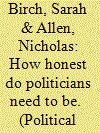

|
|
|
|
|
| Publication |
2010.
|
| Summary/Abstract |
This article reports findings from a recent survey of citizens' attitudes towards standards in British public life. It provides further evidence that people hold their political leaders to high standards, yet are often disappointed by the reality, and suggests that many citizens tend to blame the practice and institutions of politics for making politicians less honest and trustworthy than they would ideally like. The article argues that reforms to the political system are needed to regain the confidence of the population, but that the manner in which the most recent round of ethics reforms in the House of Commons were introduced may lower the prospects of their achieving this goal.
|
|
|
|
|
|
|
|
|
|
|
|
|
|
|
|
| 6 |
ID:
111501
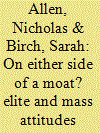

|
|
|
|
|
| Publication |
2012.
|
| Summary/Abstract |
This article develops a cognitive institutionalist account of mass and elite evaluations of political ethics, which is tested on a new dataset from the United Kingdom. The analysis explores the extent of contemporary disagreement among British political elites and those they represent by comparing responses to questions asked in a representative survey of the public with similar questions asked of incumbent MPs and parliamentary candidates. There are systematic differences between members of the public, candidates and MPs at both aggregate and individual levels - differences which can be accounted for with reference to the framing effects of Parliament as an institution. Candidates for parliamentary office display significantly more tolerance of ethically dubious behaviour than other members of the public. Within the elite category, elected MPs exhibit more permissive ethical standards than those candidates who are unsuccessful.
|
|
|
|
|
|
|
|
|
|
|
|
|
|
|
|
| 7 |
ID:
105275
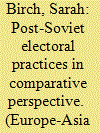

|
|
|
| 8 |
ID:
133239


|
|
|
|
|
| Publication |
2014.
|
| Summary/Abstract |
Electronic voting entered the political arena some years ago, with some countries advocating its use, some countries trialling and then abandoning it and yet others preferring to preserve the status quo of paper-and-pencil voting within a voting booth. In this paper we present the pros and cons of electronic voting and propose a set of characteristics we think electronic voting systems should exhibit. We then briefly review some pertinent concerns, issues and worries. We conclude by introducing the Handivote system, an electronic voting system that supports voting by means of SMS messaging, and explain how it measures up in terms of our own specified characteristics.
|
|
|
|
|
|
|
|
|
|
|
|
|
|
|
|
| 9 |
ID:
051503


|
|
|
|
|
| Publication |
Jan-Mar 2004.
|
|
|
|
|
|
|
|
|
|
|
|
|
|
|
|
| 10 |
ID:
111655


|
|
|
|
|
| Publication |
2012.
|
| Summary/Abstract |
In the aftermath of the August 2011 riots, politicians and commentators offered a range of explanations for the social unrest and wanton violence. Drawing on survey and focus-group data, this paper investigates those explanations by analysing how socio-economic, normative and political factors shape contemporary attitudes towards law breaking in Britain. The paper finds that both economic deprivation and personal moral values help to explain attitudes toward illegal behaviour, but citizens' mistrust of political leaders and their disengagement from public affairs are also an important factor. The findings suggest that politicians who want to provide moral leadership need to do so through their actions as well as their words.
|
|
|
|
|
|
|
|
|
|
|
|
|
|
|
|
| 11 |
ID:
140855
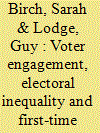

|
|
|
|
|
| Summary/Abstract |
This paper reviews the problem of declining turnout and proposes as a solution a system whereby each elector would be legally obliged to vote in the first election for which they were eligible. Popular attitudes toward first-time compulsory voting are measured and probed by means of UK data. The main findings of the paper are that first-time compulsory voting is a politically and administratively feasible proposal that appears tentatively to command popular support and has the potential to help address a number of the problems associated with declining turnout, and in particular low rates of electoral participation among younger citizens.
|
|
|
|
|
|
|
|
|
|
|
|
|
|
|
|
|
|
|
|
|